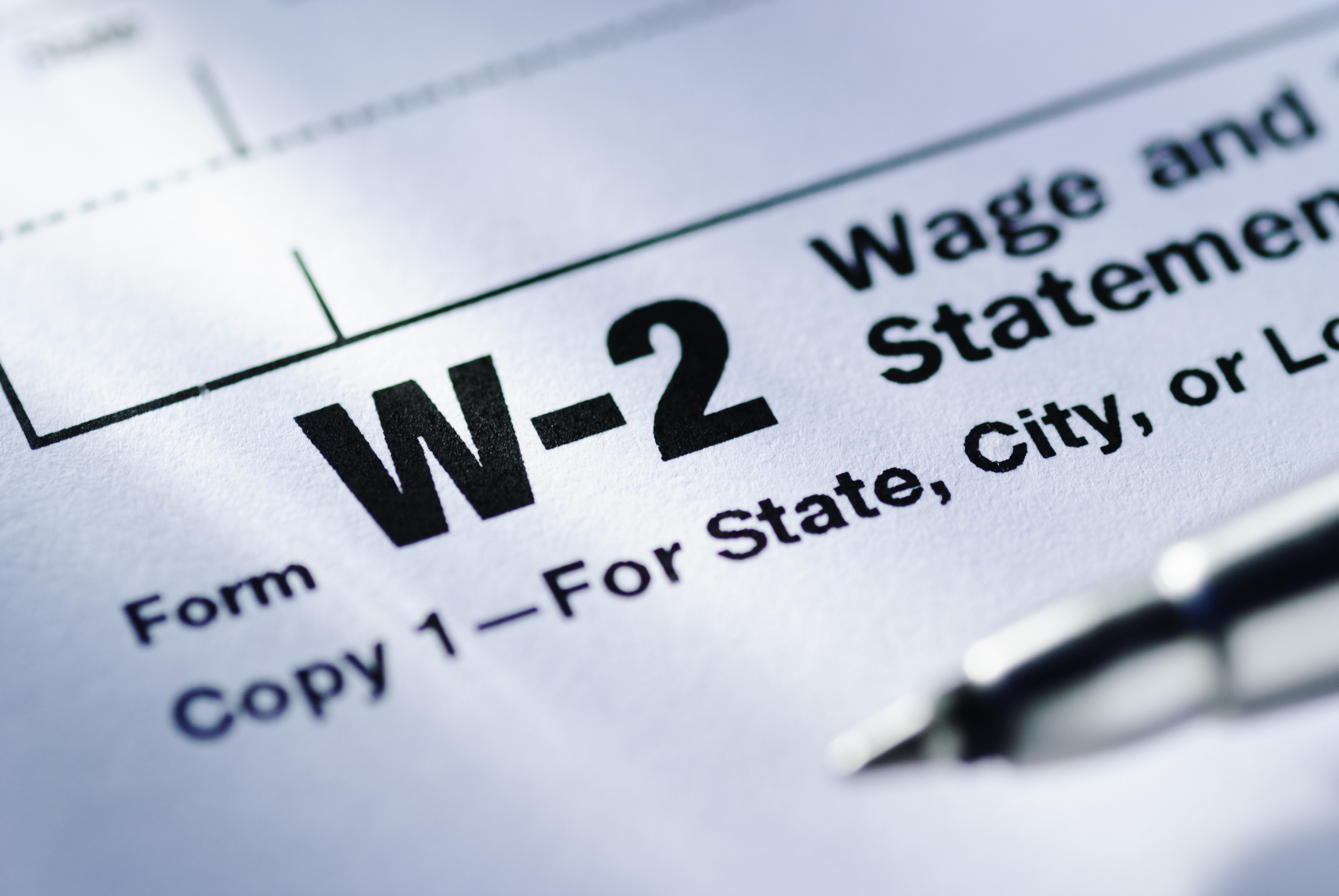Tax Scam: IRS Warns Taxpayers Against Filing False W-2 Info
Latest social media scam advises lying on your W-2 to falsely claim credits and bigger refunds.


Profit and prosper with the best of Kiplinger's advice on investing, taxes, retirement, personal finance and much more. Delivered daily. Enter your email in the box and click Sign Me Up.
You are now subscribed
Your newsletter sign-up was successful
Want to add more newsletters?

Delivered daily
Kiplinger Today
Profit and prosper with the best of Kiplinger's advice on investing, taxes, retirement, personal finance and much more delivered daily. Smart money moves start here.

Sent five days a week
Kiplinger A Step Ahead
Get practical help to make better financial decisions in your everyday life, from spending to savings on top deals.

Delivered daily
Kiplinger Closing Bell
Get today's biggest financial and investing headlines delivered to your inbox every day the U.S. stock market is open.

Sent twice a week
Kiplinger Adviser Intel
Financial pros across the country share best practices and fresh tactics to preserve and grow your wealth.

Delivered weekly
Kiplinger Tax Tips
Trim your federal and state tax bills with practical tax-planning and tax-cutting strategies.

Sent twice a week
Kiplinger Retirement Tips
Your twice-a-week guide to planning and enjoying a financially secure and richly rewarding retirement

Sent bimonthly.
Kiplinger Adviser Angle
Insights for advisers, wealth managers and other financial professionals.

Sent twice a week
Kiplinger Investing Weekly
Your twice-a-week roundup of promising stocks, funds, companies and industries you should consider, ones you should avoid, and why.

Sent weekly for six weeks
Kiplinger Invest for Retirement
Your step-by-step six-part series on how to invest for retirement, from devising a successful strategy to exactly which investments to choose.
Tax season brings tax scams like night follows day. And with all the advice circulating on the internet, it can be hard to separate the good from the bad. The IRS has recently flagged a particularly pernicious W-2 "tax hack" which encourages people to claim unearned credits and bigger tax refunds by lying about their income. Here's the breakdown of this bad idea and the legal consequences for any taxpayer unwise enough to try it.
The W-2 tax scam means lying to the IRS
The IRS is warning taxpayers about a scheme flying around on social media that advises manually altering your W-2 form to add false wage data. Scammers are advising people to invent larger-than-life withholding figures, as well as fake employers, before electronically filing the false return to obtain a giant refund. The standard deduction just isn't enough for some people, apparently.
The IRS, state tax authorities, and tax industry firms are monitoring a variety of tax schemes as Tax Day approaches. The IRS coordinates the Social Security Administration, major employers and payroll companies like ADP to review W-2 information. So if you think you can slip fake job information through the net, think again.
From just $107.88 $24.99 for Kiplinger Personal Finance
Become a smarter, better informed investor. Subscribe from just $107.88 $24.99, plus get up to 4 Special Issues

Sign up for Kiplinger’s Free Newsletters
Profit and prosper with the best of expert advice on investing, taxes, retirement, personal finance and more - straight to your e-mail.
Profit and prosper with the best of expert advice - straight to your e-mail.
Tax authorities are tracking two variants of the W-2 scheme that misuse wage info to generate a big, unearned refund.
The first type of tax scam involves filing Form 7202, Credits for Sick Leave and Family Leave for Certain Self-Employed Individuals. Scammers advise people to claim this credit for the income they earned as regular employees — rather than the intended self-employed taxpayers. These pandemic-specific credits are no longer available for use on 2022 tax returns, anyway. Trying to claim expired COVID emergency credits for the self-employed will certainly get your return flagged.
The second version of the W-2 scam is even more creative: advising taxpayers to make up fake household employees. Scammers recommend claiming hefty tax refunds for falsified family and for sick wages they never actually paid, using Schedule H (Form 1040), Household Employment Taxes. The form is designed to report household employment taxes if a taxpayer hired someone to do household work. It's not intended for making up fake employees and claiming unearned refunds.
Legal consequences of the W-2 scam
The IRS reminds people who try the W-2 scam, or any other tax fakery, that they face a wide range of financial and legal consequences. The most likely penalty is the frivolous return penalty, of $5,000.
An Erroneous Claim for Refund or Credit penalty could also apply. This penalty covers any claims for refunds or income tax credits for an excessive amount without reasonable cause. This could be up to 20% of the excessive amount claimed, so if you claimed a $20K refund, you would be penalized $4,000 for your false claim.
Filers also run the risk of criminal prosecution for filing a false tax return. In similar cases taken to trial, a single felony charge carried a sentence of up to three years in prison, a $100,000 monetary fine, and a year of supervised probation.
How to fix a false tax return
If you or anyone you know has participated in this W-2 scheme, the IRS recommends filing an amended tax return. You could also consider consulting a tax professional to get your ducks fully in a row.
Here's what to know about amended returns:
- If your filing deadline and available tax extensions haven't passed, file a "superseding return." If you file a second return before the filing deadline, the second return "supersedes" the first return and is treated as the original return.
- The IRS can correct most simple errors for you, but substantial income changes require an amended return.
- When filing an amended return, you'll probably need to submit IRS Form 1040X, which is used to:
- Correct Forms 1040, 1040-SR, or 1040-NR;
- Make certain elections after the election deadline;
- Change amounts previously adjusted by the IRS (except IRS changes to interest or penalties); or
- Claim a loss or unused credit carryback.
- You can electronically file amended Forms 1040, 1040-SR and 1040-NR for any tax year after 2018.
- You must file an amended tax return within three years from the date you filed your original return or within two years from the date you paid any tax due, whichever is later.
- Track the status of your amended tax return via the "Where's My Amended Return?" tool or by calling 866-464-2050.
A tax pro can offer more detailed advice on how to get right with the IRS. Look up credentialed tax preparers in your area, using resources like the IRS’s online Directory of Federal Return Preparers. Once you find a few you like, ask them directly for their credentials and consider checking their history and reputation via resources like the Better Business Bureau. Avoid tax preparers that take a percentage of your refund or refuse to sign your return before filing.
Related Content
- When Are Taxes Due in 2023? Tax Deadlines by Month
- What Are the Income Tax Brackets for 2023 vs. 2022?
- Biden Wants a Wealth Tax: Should Billionaires Pay More?
- Powerball Winner Will Pay Some Hefty Taxes
- Scams Cost Consumers $8.8 Billion in 2022 - The Top 5 Frauds
Profit and prosper with the best of Kiplinger's advice on investing, taxes, retirement, personal finance and much more. Delivered daily. Enter your email in the box and click Sign Me Up.

Ben Demers manages digital content and engagement at Kiplinger, informing readers through a range of personal finance articles, e-newsletters, social media, syndicated content, and videos. He is passionate about helping people lead their best lives through sound financial behavior, particularly saving money at home and avoiding scams and identity theft. Ben graduated with an M.P.S. from Georgetown University and a B.A. from Vassar College. He joined Kiplinger in May 2017.
-
 The New Reality for Entertainment
The New Reality for EntertainmentThe Kiplinger Letter The entertainment industry is shifting as movie and TV companies face fierce competition, fight for attention and cope with artificial intelligence.
-
 Stocks Sink With Alphabet, Bitcoin: Stock Market Today
Stocks Sink With Alphabet, Bitcoin: Stock Market TodayA dismal round of jobs data did little to lift sentiment on Thursday.
-
 Betting on Super Bowl 2026? New IRS Tax Changes Could Cost You
Betting on Super Bowl 2026? New IRS Tax Changes Could Cost YouTaxable Income When Super Bowl LX hype fades, some fans may be surprised to learn that sports betting tax rules have shifted.
-
 Should You Do Your Own Taxes This Year or Hire a Pro?
Should You Do Your Own Taxes This Year or Hire a Pro?Taxes Doing your own taxes isn’t easy, and hiring a tax pro isn’t cheap. Here’s a guide to help you figure out whether to tackle the job on your own or hire a professional.
-
 Don't Overpay the IRS: 6 Tax Mistakes That Could Be Raising Your Bill
Don't Overpay the IRS: 6 Tax Mistakes That Could Be Raising Your BillTax Tips Is your income tax bill bigger than expected? Here's how you should prepare for next year.
-
 Will IRS Budget Cuts Disrupt Tax Season? What You Need to Know
Will IRS Budget Cuts Disrupt Tax Season? What You Need to KnowTaxes The 2026 tax season could be an unprecedented one for the IRS. Here’s how you can be proactive to keep up with the status of your return.
-
 3 Retirement Changes to Watch in 2026: Tax Edition
3 Retirement Changes to Watch in 2026: Tax EditionRetirement Taxes Between the Social Security "senior bonus" phaseout and changes to Roth tax rules, your 2026 retirement plan may need an update. Here's what to know.
-
 A Free Tax Filing Option Has Disappeared for 2026: Here's What That Means for You
A Free Tax Filing Option Has Disappeared for 2026: Here's What That Means for YouTax Filing Tax season officially opens on January 26. But you'll have one less way to submit your tax return for free. Here's what you need to know.
-
 When Do W-2s Arrive? 2026 Deadline and 'Big Beautiful Bill' Changes
When Do W-2s Arrive? 2026 Deadline and 'Big Beautiful Bill' ChangesTax Deadlines Mark your calendar: Feb 2 is the big W-2 release date. Here’s the delivery scoop and what the Trump tax changes might mean for your taxes.
-
 Are You Afraid of an IRS Audit? 8 Ways to Beat Tax Audit Anxiety
Are You Afraid of an IRS Audit? 8 Ways to Beat Tax Audit AnxietyTax Season Tax audit anxiety is like a wild beast. Here’s how you can help tame it.
-
 3 Major Changes to the Charitable Deduction for 2026
3 Major Changes to the Charitable Deduction for 2026Tax Breaks About 144 million Americans might qualify for the 2026 universal charity deduction, while high earners face new IRS limits. Here's what to know.